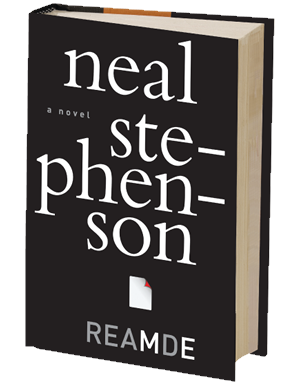January 16, 2012
Reamde
I've become a pretty big Neil Stephenson fan over the last decade, starting with the Baroque Cycle and then reading through the back catalog, and even though it took me a while to decide to pick up Anathem, I think it's now tied with The Diamond Age as being my favorite.
This new book, Reamde, is different from those.
 It's a thriller. Reviews that compared it to Snowcrash and Zodiac are not wrong (probably -- I've never read the latter), but it's blissfully missing what Rus calls "the Sumerian chapter". There's no 50-page exposition about a theory of worlds or ideas. It's just nonstop action, after a few chapters of background. I was excited by the background, because the technology and sociology both seemed plausible to me, and I think it's rare for an author to get both.
It's a thriller. Reviews that compared it to Snowcrash and Zodiac are not wrong (probably -- I've never read the latter), but it's blissfully missing what Rus calls "the Sumerian chapter". There's no 50-page exposition about a theory of worlds or ideas. It's just nonstop action, after a few chapters of background. I was excited by the background, because the technology and sociology both seemed plausible to me, and I think it's rare for an author to get both.
I try to include zero spoilers in reviews (unlike, say, the New York Times review, which gives this book's plot away all the way through to the final chapter), so I'll just give you the setting that you'd get from the first chapter anyway: Reamde is set either in the present or the very near future. In Stephenson tradition, it leaps across the globe and drops a lot of geeky references, but since we're living roughly in the present, characters talk about tweeting, and check up on each other by scanning their Facebook pages. One character is known by strangers primarily through his wikipedia page, and he's coy about which parts are fact and which are fiction.
One thing that really stuck with me is how Stephenson casts a cynical but loving eye back down on 21st century culture. A memorable scene in Anathem describes a group of obese men, wearing jerseys of a sports team, slurping sugar water from enormous cups -- not a particularly flattering or subtle characterization of Americans. But in Reamde, characters drop knowledge about Walmart, the firearms subculture, Montana cults, and southern trailer parks, and always in a positive (or at least neutral) light. Usually this knowledge is practical to the matter at hand, and frequently it helps save lives.
If true sci-fi requires a description of a technology that doesn't exist yet, this is true sci-fi. The characters live in a world in which "World of Warcraft" became surpassed by a similar game that understood how to make the MMORPG model even more successful: The economy of the game is connected to the real-world economy in a direct and theoretically secure way that makes the phrase "real-world economy" ambiguous. Players can use in-game winnings to pay their subscription fee, vastly widening the potential customer base, and professional authors are on staff to ensure that the game continues to evolve and provide ongoing entertainment. It's new, and so 20-20-hindsight-obvious that I marveled that nobody's actually written it yet.
But the story is really a long chase/action sequence, using the game as a backdrop and side quest. About one quarter of the way through, I started to get exhausted and complained to a friend that there was no natural stopping place, because things are constantly happening. The only breaks are occasional bits of whitespace where the narrative shifts point-of-view, or chapter markers when 24 hours have passed: "Day 3", it helpfully points out, before continuing with the description of an oil tanker explosion. My friend said, "Just wait till you get to the last half of the book."
I made up the oil tanker explosion, but there are events on that level of destruction and firepower. If it wasn't so intellectually grounded, it could be a new Jason Bourne movie. It probably still could. It was really hard to put down, and usually when I did, it was only because it's hard for me to stay on the edge of my seat for so long at a time.
Even so, it was a very fun read. I was hooked from the first page, and never disappointed. Strong recommendation.